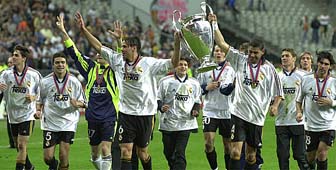Champions League win is Real triumph for Spaniards in Switzerland

Switzerland's Spanish community has been celebrating Real Madrid's victory in the final of football's Champion's League in Paris.
Geneva is home to Switzerland’s biggest Spanish community, and many of the city’s bars were full of Spaniards – and others – enjoying the finale of Europe’s top club competition, in which Real beat Valencia 3-0.
“Real are back at the top. They gave a lesson in football there,” said one ecstatic fan at the Real Betis club, in Carouge.
“But it was great for all Spaniards, because two Spanish teams reached the final of the European Cup – that’s really something. It’s not always the Italians,” he said.
It is something of a cliché to say that football is like a religion in Spain. But clichés are usually based on fact. Of the 64 clubs affiliated to Geneva’s cantonal football association, 22 of them represent foreign nationalities – and Spain, with seven, has more than anyone else.
“Football plays an important role in keeping our culture alive,” says José Luis Rodriguez, president of Etoile Espagnole, one of those seven Spanish clubs.
The bars belonging to the football clubs provide a link with the homeland. People can eat tapas, play dominoes or watch the bullfighting on Spanish television, as well as talk in their native language.
“It’s very important to maintain your culture, whether you’re Spanish, German, English or Swiss. Because if you lose your roots, you’re nothing,” Rodriguez, who has been in Switzerland for almost 40 years, told swissinfo.
“I do my utmost to ensure that my sons – even if they are Swiss – continue to maintain the Spanish culture and to love their homeland – even if we are all Europeans these days,” he says.
An estimated 100,000 Spaniards – Rodriguez included – came to Switzerland in the 1960s and 1970s to seek work or to flee the Franco regime. They were preceded by Italians and followed by Portuguese. Many have returned home, but many have remained.
Rodriguez says Etoile Espagnole welcomes players from all of Spain – and beyond. The other Spanish clubs tend to be rooted in a particular region, and form a focal point for Galicians, Catalans and Andalucians to maintain their particular traditions. They also provide a safety net for foreigners who struggle to fit in:
“In every country, you have to try to integrate. But it works both ways. You also have to be accepted,” Rodriguez, who owns a number of bars in the city, says.
“Geneva is a very reserved city. People never really tell you what they think of you. But it is up to us to integrate. And I think that – even if I remain very Spanish and mix with Spaniards, and have never wanted to become Swiss – I am very integrated.”
Wednesday night’s match was one of those occasions when Spaniards – whichever team they support – could come together and celebrate being Spanish.
by Roy Probert

In compliance with the JTI standards
More: SWI swissinfo.ch certified by the Journalism Trust Initiative
You can find an overview of ongoing debates with our journalists here. Please join us!
If you want to start a conversation about a topic raised in this article or want to report factual errors, email us at english@swissinfo.ch.